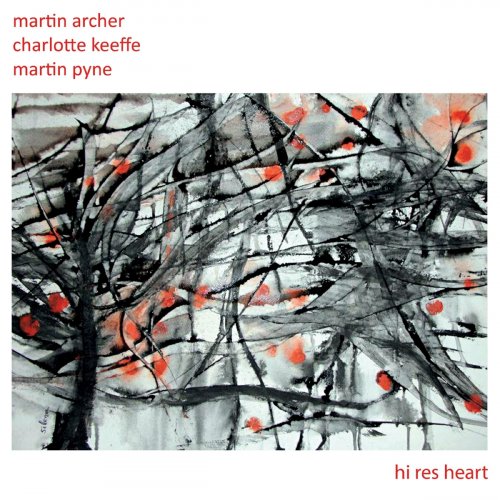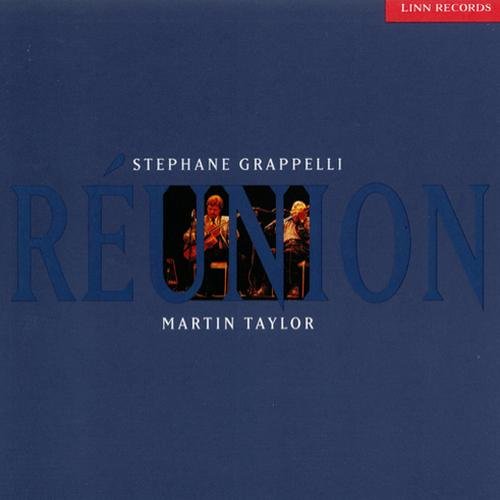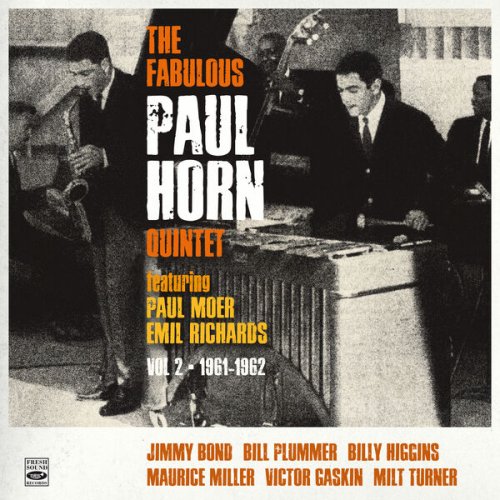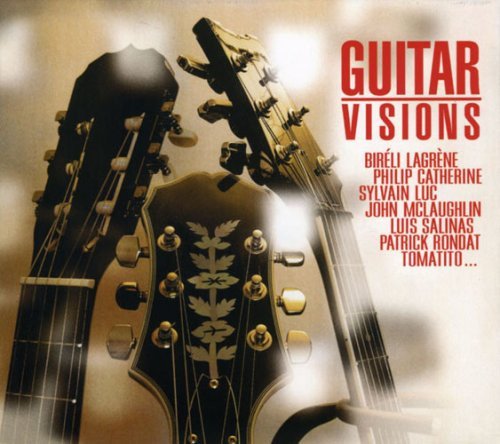Martin Archer - Hi Res Heart (2021) Hi-Res

Artist: Martin Archer
Title: Hi Res Heart
Year Of Release: 2021
Label: Discus Music
Genre: Jazz
Quality: FLAC (tracks) / FLAC 24 Bit (48 KHz / tracks)
Total Time: 64:05 min
Total Size: 343 / 722 MB
WebSite: Album Preview
Tracklist:Title: Hi Res Heart
Year Of Release: 2021
Label: Discus Music
Genre: Jazz
Quality: FLAC (tracks) / FLAC 24 Bit (48 KHz / tracks)
Total Time: 64:05 min
Total Size: 343 / 722 MB
WebSite: Album Preview
01. Silena's Fire
02. G. E. M
03. Looking for Gene
04. Song for Bobby Naughton
05. Seduction Dance
06. June
07. Jean
08. Earth Memory
09. Sleep Uneasy
10. The Story in the Mirror
11. Tommy
12. Dolly Grip
Back in 1978 Bobby Naughton’s vibraphone hung notes over Leo Smith’s first album for ECM, the great Divine Love. If music could be translucent, this was. The central line-up consisted of Leo Smith, trumpet, Dwight Andrews, reeds and Mr Naughton. It was a ground breaker. This new album from Discus carries a similar instrumental triad. Track 4, Song For Bobby Naughton features some Martin Pyne vibraphone but in a very different way to Naughton, building a Martin Archer melody into an improvisation. It takes the trio on a journey almost twice the length of any of the other 13 tracks on Hi Res Heart. The ‘stretch’ is worth it, Charlotte Keeffe produces a trumpet excursion with just about every ‘out’ brass technique available. Literally a ‘real time’ bender.
Though Mr Archer dedicates the session to the 1970’s heyday of Chicago’s AACM collective, the new album is a mid-lockdown 20/21 UK production. Each musician contributes four pieces as initial templates for the other two players to add their own parts in response. Isolation improv… but you’d never know it by ear. There’s an ‘of the moment’ feel to the session. Jean is a Ms Keeffe brainwave, squeezed brass taken over by saxophone playing a repeated Art Ensemble vamp. It sounds perfectly aligned as if all the action comes from a direct real time encounter. The playing is exemplary, so are the ears picking up on each pre-recorded nuance; a spine teaser (Martin Pyne’s got some bright gongs in his percussion bag).
Two of his contributions Earth Memory/Sleep Uneasy are listed back to back. Although both have double tracked vibes over-and-under traps, each example has a different facet of approach. Earth is a brass/reeds written-through refrain. It switches on Martin Archer’s soprano inflexions and Charlotte Keeffe’s trumpet. Beautifully loose limbed lead lines, tightly drawn in under 5 minutes set up the ears for Sleep Uneasy. Here almost every instrument the trio has at their disposal (to my knowledge 16 and counting) works out. Deep drone baritone, Ms Keeffe’s brass pressed into a squeegee ball with vibes and flute emerging like a Tony Scott mantra. It’s just short of six minutes; in truth it could have gone on purposefully for another six. Joseph Jarman would recognise his own influence on this approach. As would his Art Ensemble partner Lester Bowie on Charlotte Keeffe’s playful tipping-a-hat trick to the Great Pretender’s playful ‘duck calls’ on her composition Tommy. A fitting abstraction memorising 1969’s A Jackson In Your House – a circus of sounds where even ‘the riot’ is riotous fun.
What impresses with this recording is over fourteen tracks, these three protagonists get the opportunity to explore the spaces between them. A minus turns to plus. The enforced separation of the lockdown could have worked against them instead it’s accentuated their individuality.
These days Martin Archer is often heard in relatively large ensembles. Hi Res Heart is stripped down creating a platform where he’s easily distinctive. He’s able to maximise the unpacking of his range of horns. We all know how good the guy is. In this setting there’s an opportunity to spot-sound his personal ‘hornweb’. Archer does as Archer is, target practicing those multi-reeds together, letting sparseness fill the space. Just one of the attributes of the original Association of Advancement of Creative Musicians (AACM) was their ability to borrow ideas from one another. It’s what happens here too.
Charlotte Keeffe retains her own thing. She’s not faking either Wadada Leo Smith or Lester Bowie, but she doesn’t ignore them either. This is a musician who continues to work in a lot of different contexts yet keeps the essential ‘Keeffe’. Given the context Martin Pyne could have played safe and stayed close to Naughton’s role. He does a bit of borrowing but this ain’t 1978, Mr Pyne is now. High resolution, many pixels at play, this is truly a 2020’s album, music of its own time. - Steve Day: 2021
Though Mr Archer dedicates the session to the 1970’s heyday of Chicago’s AACM collective, the new album is a mid-lockdown 20/21 UK production. Each musician contributes four pieces as initial templates for the other two players to add their own parts in response. Isolation improv… but you’d never know it by ear. There’s an ‘of the moment’ feel to the session. Jean is a Ms Keeffe brainwave, squeezed brass taken over by saxophone playing a repeated Art Ensemble vamp. It sounds perfectly aligned as if all the action comes from a direct real time encounter. The playing is exemplary, so are the ears picking up on each pre-recorded nuance; a spine teaser (Martin Pyne’s got some bright gongs in his percussion bag).
Two of his contributions Earth Memory/Sleep Uneasy are listed back to back. Although both have double tracked vibes over-and-under traps, each example has a different facet of approach. Earth is a brass/reeds written-through refrain. It switches on Martin Archer’s soprano inflexions and Charlotte Keeffe’s trumpet. Beautifully loose limbed lead lines, tightly drawn in under 5 minutes set up the ears for Sleep Uneasy. Here almost every instrument the trio has at their disposal (to my knowledge 16 and counting) works out. Deep drone baritone, Ms Keeffe’s brass pressed into a squeegee ball with vibes and flute emerging like a Tony Scott mantra. It’s just short of six minutes; in truth it could have gone on purposefully for another six. Joseph Jarman would recognise his own influence on this approach. As would his Art Ensemble partner Lester Bowie on Charlotte Keeffe’s playful tipping-a-hat trick to the Great Pretender’s playful ‘duck calls’ on her composition Tommy. A fitting abstraction memorising 1969’s A Jackson In Your House – a circus of sounds where even ‘the riot’ is riotous fun.
What impresses with this recording is over fourteen tracks, these three protagonists get the opportunity to explore the spaces between them. A minus turns to plus. The enforced separation of the lockdown could have worked against them instead it’s accentuated their individuality.
These days Martin Archer is often heard in relatively large ensembles. Hi Res Heart is stripped down creating a platform where he’s easily distinctive. He’s able to maximise the unpacking of his range of horns. We all know how good the guy is. In this setting there’s an opportunity to spot-sound his personal ‘hornweb’. Archer does as Archer is, target practicing those multi-reeds together, letting sparseness fill the space. Just one of the attributes of the original Association of Advancement of Creative Musicians (AACM) was their ability to borrow ideas from one another. It’s what happens here too.
Charlotte Keeffe retains her own thing. She’s not faking either Wadada Leo Smith or Lester Bowie, but she doesn’t ignore them either. This is a musician who continues to work in a lot of different contexts yet keeps the essential ‘Keeffe’. Given the context Martin Pyne could have played safe and stayed close to Naughton’s role. He does a bit of borrowing but this ain’t 1978, Mr Pyne is now. High resolution, many pixels at play, this is truly a 2020’s album, music of its own time. - Steve Day: 2021




![Various Artists - Lost Tracks: Accra to Addis (2026) [Hi-Res] Various Artists - Lost Tracks: Accra to Addis (2026) [Hi-Res]](https://img.israbox.com/img/2026-02/26/lqvyrzr9f9yed5j0r3zv7c1r6.jpg)



![Mehmet Ali Sanlikol - The Electric Oud Man Speaks and You Listen... (2026) [Hi-Res] Mehmet Ali Sanlikol - The Electric Oud Man Speaks and You Listen... (2026) [Hi-Res]](https://img.israbox.com/img/2026-02/28/0areq907i6p8nj96306jai1a0.jpg)